The French Health App You Need to Download
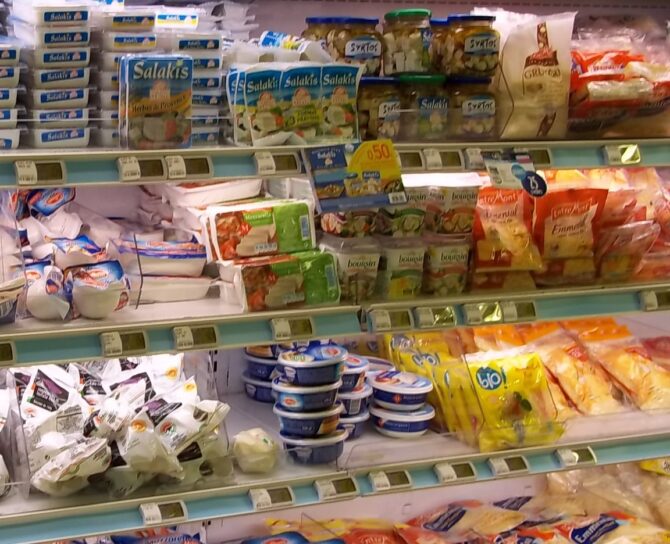
It’s hard to figure out if a food or cosmetic product is healthy. The packaging may claim the product is “healthy” or “organic,” but analyzing a label can be confusing due to unfamiliar ingredient names and their unknown health impact. But Yuka knows and tells all.
Yuka is a phone app for Mac and Android that deciphers confusing product labels by scanning a package’s bar code and analyzing the ingredients. The health impact based on ingredients is instantly provided by rating the product based upon Yuka’s specific criteria. It also offers healthier options. Developed and designed by a French team of technologists and marketers, Yuka is a huge success in France and Britain and entered the US market in 2022, where it has also been a hit. Yuka currently has 54 million users, according to its website.

Yuka cofounders Benoît Martin (left), Julie Chapon (center) and François Martin (from Yuka’s Instagram account)
Cofounder Benoît Martin was inspired to develop the app because he wanted to buy healthy products for his three children. He realized that interpreting product information was complicated because there was lots of information and confusing ingredients he didn’t understand.
“Benoît thought it would be amazing to have a tool that simply and quickly tells you if your product is good or bad for your health,” said Julie Chapon, another Yuka cofounder. “That’s how Yuka started.”
Along with Benoît’s brother, François, the trio developed the app and cofounded the company in France in 2016. Using algorithms and AI technology, Yuka reads the information provided in the packaging bar code and automatically analyzes and rates the product based on Yuka’s formula for nutritional quality (60% value), additives (30% value) and organic ingredients (10% value). The formula also considers the number of calories and amount of sugar, salt, saturated fats, protein and fiber plus if the product is certified organic. Yuka then rates the product as excellent, good, poor or bad and provides a selection of alternative products that have a better or similar rating.
View this post on Instagram
The product ingredient rating was developed from analyzing 5 million+ products. The information is provided by each product brand and from information from Yuka users.
Importantly, Yuka is completely independent of brands or manufacturers that could potentially influence the rating of a product or recommendations the app offers. Plus, there is no advertising on the app and funding resources are also independent and can’t compromise the objectivity of the analysis.
Using the app is free but there is a premium membership of $15 per year that allows setting up alerts for food preferences such as gluten or vegan ingredients and the ability to use the app in offline mode.
Chapon and the Martin brothers recently spent a year in New York City to promote their app in the United States. Chapon decided to stay in New York for another year to continue developing the US market.
The first time I used Yuka was to test Tuc crackers, my favorite French cracker for snacking and cheese. Tuc Originals scored 3 out of 100 (3/100) putting them firmly in the bad category. They contain a preservative, anticaking agents and artificial flavoring along with too much saturated fat, salt and calories. Their excellent level of protein, fiber and low sugar doesn’t help the score much. Oh my.
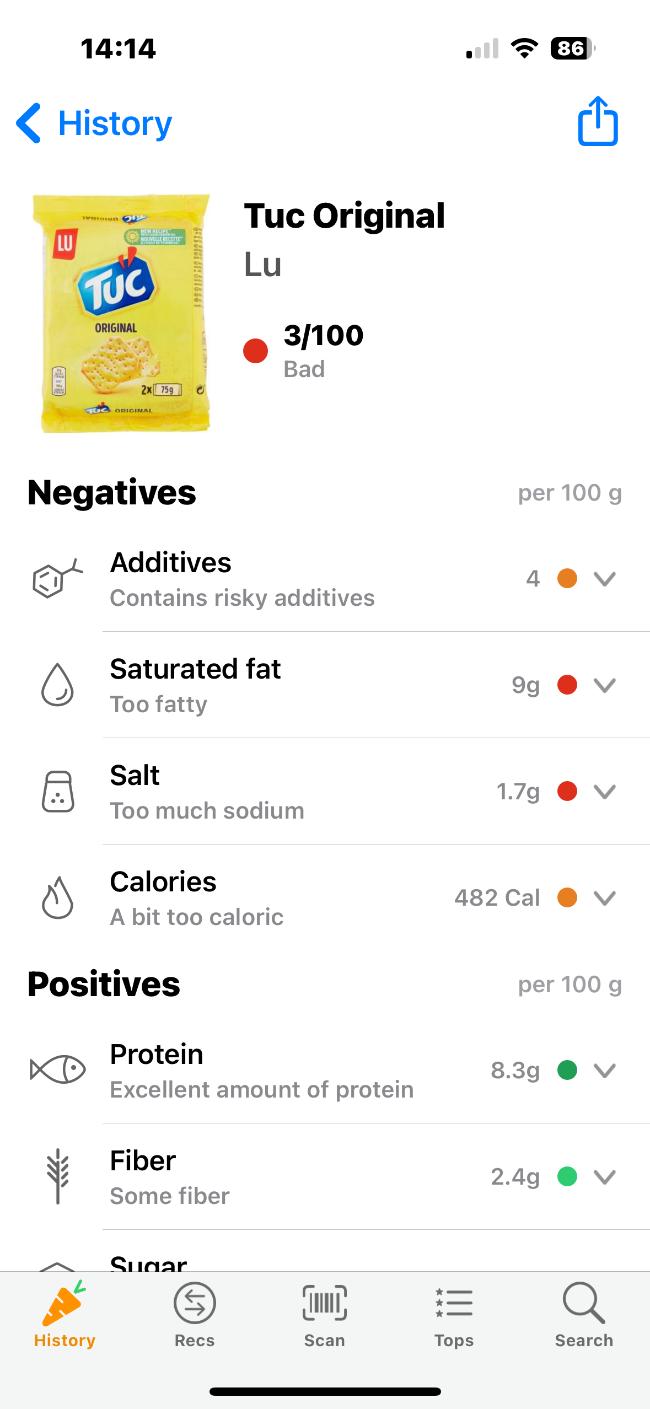
Yuka app’s rating on Tuc crackers
I then started using Yuka on other products to see how they rated. My usual yogurt choice rated poor, but there were great alternatives such as Chobani and Fage that rated 90/100. My husband’s favorite Skippy peanut butter rated better than expected (57/100), mostly because of no additives. Lean Cuisine’s fish dinner rated poor with 48/100, but when I’m in France I’ll continue to buy Picard’s Yakitori chicken sticks as they are rated at 63/100.
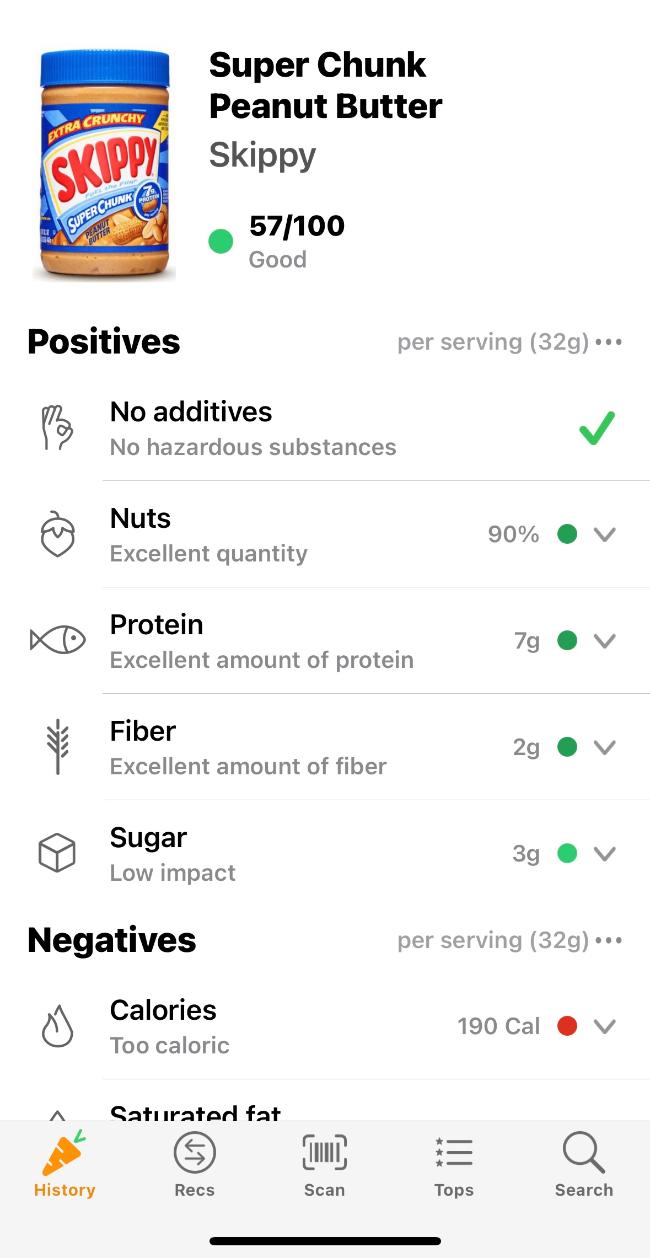
Yuka apps rating on Skippy peanut butter
Much of the food we consume or cosmetic products we use are processed. We eat canned soups, crackers, frozen meals, yogurt and milk and we use shampoos, facial creams and toothpaste without really thinking about the ingredients in the product. But the Yuka app has made me smarter about what I buy as I can make judgements on the information provided. For example, Del Monte’s canned mandarin oranges rated poor (49/100) due to five additives to avoid but Geisha’s mandarin oranges rated good at 72/100. I bought the Geisha oranges.
Yuka confirms information found on product packaging. For example, the lentil chips package said they are “bio” (organic) so they should be good and healthy. Right? Until the Yuka app scan of the of the bar code rated the chips as poor, giving it a 47/100. Organic and low in sugar (all good) but too much sodium and too many calories. Regarding cosmetic products, the John Frieda hair products I have used for years all rate poor or bad. Yuka can make my shopping smarter as better alternatives are provided.
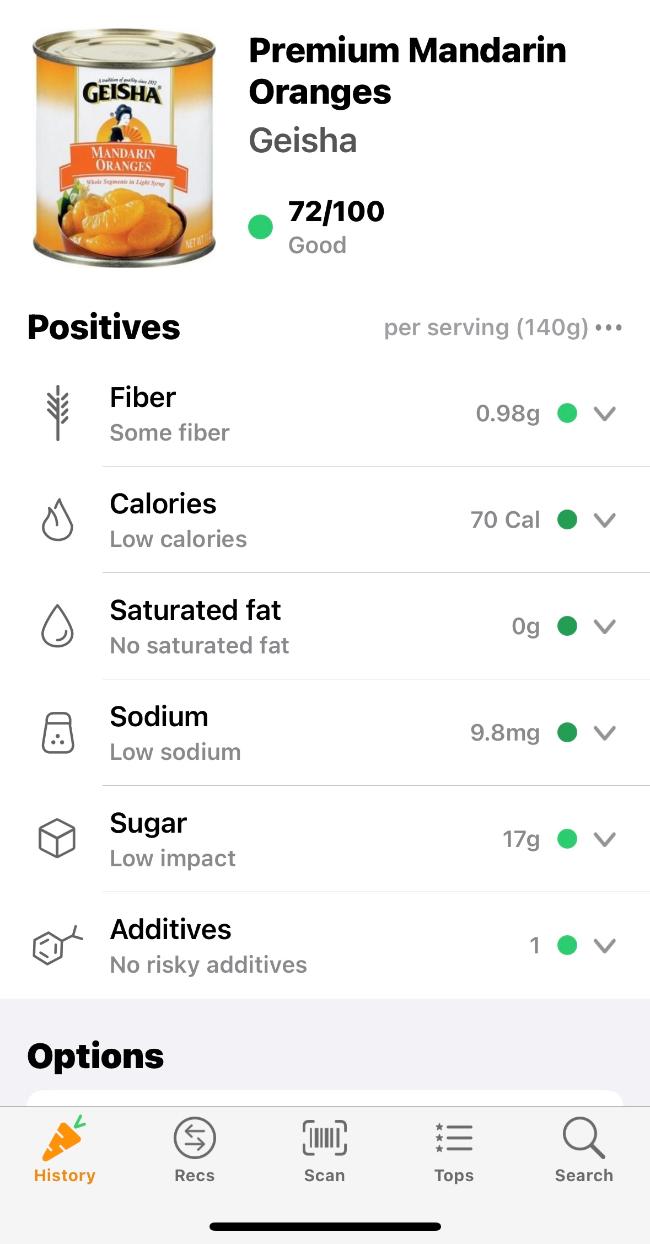
Yuka app’s rating on mandarin oranges
According to the Yuka Social Impact Report, 91% of users consider Yuka one of the most useful applications on their phone. In addition, 92% of users don’t buy a product if it is rated in the bad category and 83% of users buy higher quality products.
In addition, according to Chapon, Yuka and its user’s actions have made an impact on the industry in France with stores and brands changing their products to perform better.
“The president of Intermarché reformulated 900 products and they removed 142 controversial additives from their own products thanks to Yuka,” said Chapon. “Also, Nestle told us that Yuka has had an impact on how it makes its products… We did this project to have an impact on users but an impact on manufacturers was something really huge and was made possible by the fact that now we have millions of users.”
Even Chapon has favorite products that do not rate well on Yuka.
“I like sour candies,” she said, “and I think it’s the worst possible product in the market because it is full of sugar and additives. And I love mac and cheese but lots of them are bad. So I decided to stop buying them because they are not good for my health, yet for lots of products you can find a better alternative.”
Regarding the sour candies, she buys them from time to time, especially around Halloween or Christmas. The beauty about Yuka is that each user can make up their own mind about what to buy and how often, even if the product has a low score.
Guess that means I can still buy my favorite Tucs. Occasionally.
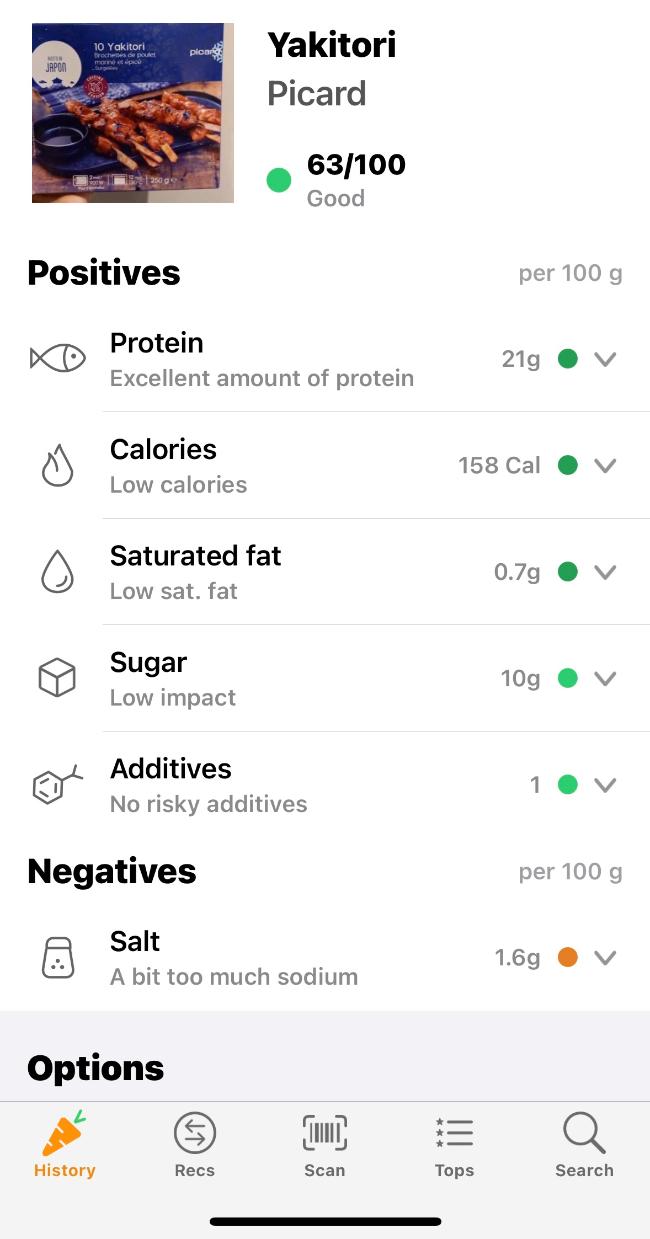
Yuka app’s rating on Picard’s Yakitori
Lead photo credit : Grocery products at Monoprix. Photo credit: ellevalentine/ Flickr
More in food and drink, French app, Nutrition, technology, Yuka


